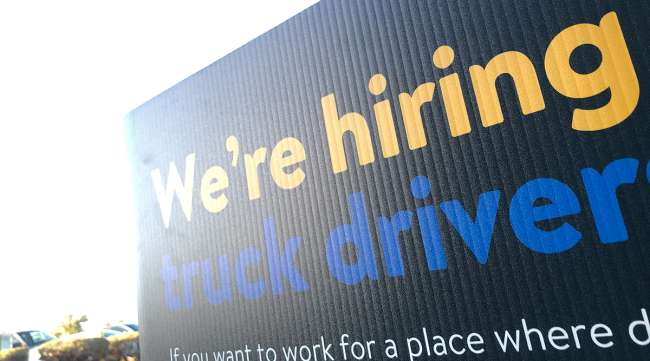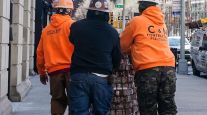Senior Reporter
Trucking Companies Increase Hiring to Bolster Supply Chain

[Stay on top of transportation news: Get TTNews in your inbox.]
While fears are growing that the spread of the coronavirus is pushing the U.S. economy into a recession, and jobs will be lost as thousands of businesses such as restaurants, hotels and the tourism industry lay off workers, some transportation-related companies are hiring. And by all indications, those companies are looking to ramp up as quickly as possible.
On March 16, Amazon announced it was hiring as many as 100,000 warehouse workers and other employees to keep up with the surge in demand from consumers buying food and other supplies online.
The company also said its current employees would get a raise of $2 an hour through April.
The positions will be full and part time and pay a minimum of $15 an hour.
Some sectors of the trucking industry, which already has a driver shortage of more than 61,000, are actively looking for drivers because grocery stores and other retailers have been swamped.
Grocery giant Albertsons, the parent company of brands such as Jewell-Osco, Safeway and Tom Thumb, told Transport Topics it is looking for drivers.
Many of the positions do not require a commercial driver license because, the company said, there has been a surge in online grocery ordering, and many of the jobs are for its home grocery-delivery service.
“It’s fair to say that for our entire company [not just the Dallas area], we are always hiring CDL-A’s for all of our distribution centers,” Albertsons spokesman Andrew Whelan told TT.
A CDL-A is required for a truck driver to operate a rig with a gross vehicle weight of 26,001 pounds or more.
The hiring situation is especially acute in several southern locations, including Dallas-Fort Worth, where Albertsons says it could hire as many as 4,000 new employees.
“In order to serve the increasing needs of our communities throughout DFW, Austin, Houston and Louisiana, Albertsons, Tom Thumb and Randalls are immediately hiring temporary and permanent in-store employees and delivery drivers [no CDL required],” the company said in a statement.

Reymer
Trucking industry recruiter Jeremy Reymer is CEO of Indianapolis-based Driver Reach. He said his phones are ringing off the hook as companies look to fill vacancies.
“I’ve got friends who are freight brokers, and they are saying they are as busy as they can be and as busy as they’ve ever been in a long time,” he said. “It’s a major shot in the arm as far as that standpoint goes. The demand for freight is huge as every single consumer in the United States is buying stuff and ordering whatever they can.”
Trucking industry consultant Randy Mullett, CEO of Mullett Strategies, told TT that in the short term, the trucking industry employment picture looks pretty good. But a lot will depend on how much damage is done to the economy by the coronavirus.

Mullett
“I don’t see it abating, as we have more and more calls for people to stay home,” Mullett said. “We’ll need delivery services, whether it’s full-blown truck drivers or last-mile, first-mile type of things. There’s going to be a lot of demand for that, at least in the short term.
“And it’s not all tractor-trailer-driven. Every delivery truck, every bread truck, every beer truck. For now, it doesn’t look like there’s any end in sight.”
Mullett said there may be a fundamental change coming in the economy that is positive in the long term for trucking.
“Loading trucks is not automated. Stocking warehouses is not. A lot of things that are in our wheelhouse are going to keep going and in a big way,” he said.
During this crisis, the Federal Motor Carrier Safety Administration said it is relaxing hours-of-service regulations, so drivers delivering medical supplies, food and other necessities are exempt.
Reymer said the trucking industry now is being viewed as a first responder.
“The dynamics are such that we are, as an industry, in a position as an industry to transport and provide the necessary items to hospitals and those people in need,” he said. “If you’re on social media much, you hear about truckers and what they’re doing. It’s almost like in war, in times of war, how you treat the troops. When times are tough, and there’s a disaster, then truckers are the ones that are there.”
Want more news? Listen to today's daily briefing:




